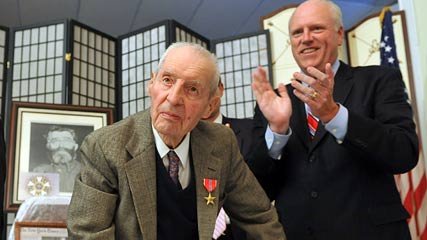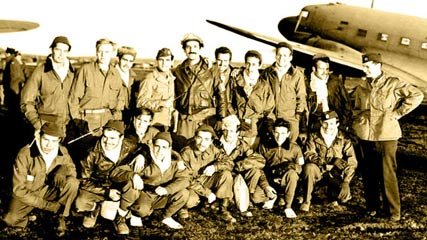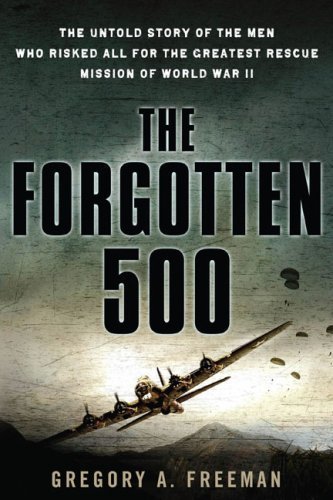« "Man Up Harry Reid" ......Sharron Angle Wins Debate | Main | Democrats Tell You Why You Should NOT Vote For Democrats! »
October 18, 2010
95-Year-Old NYC Man Gets Medal for WWII Rescue

Rep. Joseph Crowley, D-N.Y, right, presented 95-year-old George Vujnovich, left, with the U.S. Bronze Star Medal at a ceremony in New York City on Sunday. Vujnovich is credited with leading the Halyard Mission to rescue more than 500 U.S. bomber fliers shot down over Nazi-occupied Yugoslavia
.

This Dec. 28, 1944 photo shows OSS Capt. George Vujnovich, right, in Bari, Italy with a group of airmen he helped rescue after they were downed over Nazi-occupied Serbia. It was the largest air rescue of Americans behind enemy lines in any war
.
95-Year-Old NYC Man Gets Medal for WWII Rescue
NEW YORK (Oct. 17)
The U.S. government has recognized the World War II architect of a mission to rescue more than 500 U.S. bomber fliers shot down over Nazi-occupied Serbia - the largest air rescue of Americans behind enemy lines in any war.
George Vujnovich, a 95-year-old New Yorker, is credited with leading the so-called Halyard Mission in what was then Yugoslavia.
On Sunday, he was awarded the U.S. Bronze Star Medal, presented by Rep. Joseph Crowley, D-N.Y., at Manhattan's St. Sava Serbian Orthodox Cathedral. Vujnovich received a standing ovation from a crowd of several hundred church members, supporters, friends and officials.
"Better now than never," says Vujnovich, a retired salesman who lives in Queens.
He was an officer of the OSS, the precursor of today's CIA, when about 500 pilots and other airmen were downed over Serbia in the summer of 1944 while on bombing runs targeting Hitler's oil fields in Romania, according to U.S. government field station files, stored in the National Archives.
The airmen were hidden in villages by Serbian guerrilla fighter Draza Mihailovich, leader of the Chetniks, whom Yugoslav communist officials considered to be Germany's collaborators.
"This mission would not have succeeded without the great courage of Draza Mihailovich and his brave men," said Vujnovich, a Serbian-American and a Pittsburgh native who was stationed in Bari, Italy.
It was no small feat to convince American officials to allow him to work with Mihailovich on the clandestine mission, dubbed Halyard, meaning a rope used to hoist sails. By then, President Franklin D. Roosevelt had decided to follow British Prime Minister Winston Churchill's lead, abandoning support for Mihailovich in favor of the Yugoslav communists, the strongest grass-roots guerrilla force fighting the invading Nazis and Italian fascists.
Mihailovich had been a prewar military officer who launched the first Balkan resistance to the Nazis in 1941, before also turning against the communists led by Marshal Josip Broz Tito.
"Vujnovich is the one who sold the mission to U.S. officials, he pushed hard," said U.S. Army Lt. Col. Steven Oluic, a former West Point professor who prepared the award submission for the Department of the Army.
On Aug. 2, 1944, three OSS agents strapped with radio transmitters were airdropped near Mihailovich's headquarters to set up the operation.
Dozens of U.S. military cargo planes flew in over the months to pick up the airmen as they were downed. Serbian villagers had helped them build an airstrip by the village of Pranjani.
"We owe Vujnovich big time," says Charles L. Davis III, 91, of Church Falls, Va., a retired U.S. Air Force lieutenant colonel who was rescued.
As a bombardier navigator, he was part of a crew of 10 on a B-24 Liberator plane crippled after losing three of its four engines.
The fliers parachuted into a mountainous region where local farmers brought them to their houses and barns. During the next 66 days, the Americans moved each night to a different location so as not to be captured by the occupying Germans.
Yugoslavia's postwar communist authorities convicted Mihailovich of collaborating with the Nazis in a hasty trial in 1946, and he was executed.
In 1948, U.S. President Harry Truman posthumously bestowed the Legion of Merit on the Serb for the rescue - an honor classified secret by the U.S. State Department for decades, so as not to disrupt the rather friendly U.S. policy toward Yugoslavia.
The secrecy underscores long-lasting divisions in Serbia stemming from World War II; some Serbs still believe Mihailovich was a victim of communist repression, while others view him as a traitor.
The story is told in a 2007 book titled "The Forgotten 500," by Gregory Freeman.
.

.
HONORING CAPTAIN GEORGE M. VUJNOVICH
Extension of Remarks Submitted by Rep. Dan Burton
September 28, 2010

Dan Burton Member of Congress
Madame Speaker, as co-founder and co-chair of the Congressional Serbian Caucus, I rise tonight to honor an outstanding Serbian-American, Captain (Ret.) George M. Vujnovich, who was recently awarded the Bronze Star Medal, for his heroic actions during World War II.
The Bronze Star is awarded to military service personnel for bravery, acts of merit or meritorious service. When awarded for bravery, it is the fourth-highest combat award of the United States Armed Forces. Captain Vujnovich’s participation in the planning and execution of Operation Halyard – one of the most successful air force rescue missions in history; and an operation so secret that the records were only declassified in 1997 – certainly exemplifies the heroism required to receive this prestigious military honor.
Captain Vujnovich served with the Office of Strategic Services; the predecessor of the modern Central Intelligence Agency (CIA), and the wartime organization charged with coordinating activities behind enemy lines for the branches of the United States military. Operation Halyard evolved in wake of the Allied bombing campaign to destroy Nazi Germany's vast network of petroleum resources in occupied Eastern Europe. The most vital target of bombing was the facilities located in Ploesti, Romania, which supplied 35 percent of Germany's wartime petroleum. Beginning in April 1944, bombers of the Fifteenth Allied Air Force began a relentless campaign to blast the heavily guarded facilities in Ploesti in an attempt to halt petroleum production altogether. By August, Ploesti was virtually destroyed — but at the cost of 350 bombers lost, with their crews either killed, captured, or missing in action.
The assault on Ploesti forced hundreds of Allied airmen to bail out over Nazi-occupied eastern Serbia, an area patrolled by the Allied-friendly Chetnik guerrilla army. When the Chetnik commander, General Draza Mihailovich, realized that Allied airmen were parachuting into his territory, he ordered his troops, as well as the local peasantry, to aid the aviators by taking them to Chetnik headquarters in Pranjani, Serbia for evacuation.
General Mihailovich's attempts to alert American authorities to the situation regrettably initially failed to produce action. Fortunately, fate would have it that when Mirjana Vujnovich, a Serb employee of the Yugoslav embassy in Washington, D.C., heard of the trapped airmen, and immediately wrote to her husband, Captain Vujnovich, stationed in Bari, Italy. As an American, descending from Serb parents, Vujnovich knew the region intimately and also knew how to escape from Nazi-occupied territory: he had been a medical student in Belgrade when Yugoslavia fell to the Axis powers in 1941, and he and his wife spent months sneaking through minefields and begging for visas before they finally escaped from Nazi-occupied Europe.
Captain Vujnovich made it his personally crusade to get the airmen home. From the outset though, Operation Halyard encountered opposition from Allied leaders — from the U.S. State Department, from communist sympathizers in the British Special Operations Executive (SOE), even from British Prime Minister Winston Churchill himself. It was an operation that seemed condemned from the start, but Captain Vujnovich’s persevered rather than let the mission die. His persistence not to be in vain, eventually he won out. Even thought the operation endured from August 9, 1944 through December 27, 1944, within only the first two days, Operation Halyard successfully retrieved 241 American and Allied airmen. By the time the Operation was officially ended, Vujnovich's team had airlifted 512 downed Allied airmen to safety without the loss of a single life or aircraft — a truly impressive accomplishment.
Captain George Vujnovich’s recognition as a hero and valued asset to this country and the United States Air Force is long over due. Frankly, had the records of the operation not remained sealed until 1997, I feel certain Captain Vujnovich would have received this honor years ago. Nevertheless, the decades do not and cannot diminish the valor and patriotism of this extraordinary man. I ask all my colleagues to join me now to honor this Serbian-American hero, to thank him for his dedicated service to our country and to congratulate him for winning the Bronze Star. Captain Vujnovich, I salute you.
.

Wild Thing's comment........
Great story about a great man Major George Vujnovich. Thank you for all you did. Congratulations and God Bless You.
A long overdue award.
 ....Thank you Mark for sending this to me.
....Thank you Mark for sending this to me.
Mark
3rd Mar.Div. 1st Battalion 9th Marine Regiment
1/9 Marines aka The Walking Dead
VN 66-67
Posted by Wild Thing at October 18, 2010 04:48 AM
Comments
What a grand story. It makes me wonder how many other great stories of heroism, success and intrigue from WWII will never be heard as this generation dies out. Too bad that so much of our wartime escapades are kept classified for fifty years.
Mr Vujnovich deserves a higher award than the Bronze Star. I would say maybe the DSC.
Posted by: TomR, armed in Texas at October 18, 2010 10:12 AM
Spectacular story.
Thanks for sharing.
I will look for Greg Freeman book.
Posted by: Carlos at October 18, 2010 10:44 AM
Tom, see that is the thing. I agree so much Tom, one has to wonder how many more stories like this are out there and never being told.
Posted by: Wild Thing at October 19, 2010 12:26 AM
Carlos, I agree this has to be a great book to get.
Posted by: Wild Thing at October 19, 2010 12:27 AM
